State Secretary: Citizens Need Not Fear DORH, Police Having Access to Their Accounts
ZAGREB, 20 April 2022 - State Secretary at the Finance Ministry Stjepan Čuraj said on Wednesday that citizens didn't have to be afraid of the bill which would enable DORH, customs and tax administrations and the police to have access to a registry that contains records of accounts held by business entities and citizens.
"Citizens don't have to be afraid of access to their accounts," Čuraj (HNS) told the press in the parliament, adding that the court decided on that as before.
This is, he said, about ensuring the implementation of the European directive, with complete application of personal data protection.
"It actually facilitates something all bodies in the procedure have already been entitled to," he said.
"We are not talking about any data on the account balance or transactions, but only information about the actual account holders or bank safes and authorised persons, all with the aim to facilitate investigations, possible prosecution and to prevent criminal offences," he pointed out.
The State Attorney General's Office (DORH) and the police will have access to that data, he said, but also the customs and tax administrations with the authorisation and at the request of DORH, when it comes to obtaining financial data.
He noted that the customs and tax administrations had performed financial analyses and investigations before, within their powers and on the orders of competent bodies, which they would continue to do.
The Finance Ministry has put to public consultation a bill that facilitates the use of financial information to prevent and detect criminal offences, and in addition to the Anti-Money Laundering Office, it would enable the State Attorney General's Office (DORH), customs and tax administrations and the police to have access to the registry.
For more, check out our politics section.
Croatian Finance Ministry Proposes Bill to Prevent Money Laundering
April the 19th, 2022 - The Croatian Finance Ministry has proposed a new bill (law) in which multiple state institutions would be able to see into the bank accounts of those who hold them in the Republic of Croatia, which would come as an overstep of a boundary for many.
As Poslovni Dnevnik writes, the Croatian Finance Ministry has submitted a legal proposal for public discussion, which would give access to the register of the bank accounts held by both companies and regular people in Croatian banks to the State Attorney's Office, Customs, Police and Tax Administration, in addition to the Office for the Prevention of Money Laundering, Jutarnji list reports.
This is a bill to facilitate the use of financial and other information for the purpose of preventing, detecting, investigating or prosecuting serious crimes, which includes the identification, monitoring and freezing of assets related to these crimes. According to the Croatian Finance Ministry, this proposal would incorporate the latest European Union (EU) Directive on the prevention of money laundering, tax evasion and other forms of financial crime into Croatian national legislation.
Something known as the Single Registry of Accounts (Croatian: Jedinstveni registar racuna/JRR) was established as a central registry of bank accounts way back in 2002 and is maintained by the Financial Agency (Fina) in this country. In addition to keeping hold of the data about the owners of various different bank accounts, it also contains data on payment accounts, savings and deposit agreements held with credit unions and more.
Since back in 2011, the aforementioned register also includes data on consumer accounts opened with banks operating here in the Republic of Croatia. The register, however, does not contain information on the balance of these bank accounts, which is important to note given the apparent invasion of privacy this may look like to many people.
For more, check out our politics section.
Finance Ministry to Issue Bonds on International Financial Market
ZAGREB, 13 April 2022 - As the maturity of the oldest Croatian euro bond in the amount of €1.25 billion is approaching, the Finance Ministry will for the first time this year issue a bond on the international financial market, with 2032 as the year of maturity.
The Finance Ministry on Wednesday opened a subscription book for new Croatian euro bonds ahead of 30 May, the maturity date of the €1.25 billion euro bond, the oldest Croatian euro bond issued in 2014.
The expected maturity date of the new issue is 2032, RBA analysts said.
Finance Minister Zdravko Marić said in late February an international bond issue was being prepared, to be followed by another issue on the domestic market in July.
Croatia last issued government bonds on the international financial market in March 2021, in two tranches - a €1 billion bond with 2033 as the year of maturity, an annual coupon rate of 1.125% and a yield of 1.257%, and one maturing in 2041 in the nominal amount of €1 billion, with an annual coupon rate of 1.75% and a yield of 1.788%.
The latter bond was the first issue to mature in 20 years, the longest period of maturity in the country's history on the international financial market.
For more, check out our business section.
Independent MP Collects 34 Signatures for No-Confidence Motion Against FinMin
ZAGREB, 15 Oct 2021 - Independent member of parliament Karolina Vidović Krišto said on Friday she had collected signatures of 34 lawmakers for her initiative to launch a no-confidence vote in Finance Minister Zdravko Marić because he had stayed on a yacht owned by a private businessman this summer.
Vidović-Krišto said that she was glad that the initiative was supported by 34 MPs from different ideological groups.
"This is great news for citizens, as the MPs have overcome their partisan frameworks and are fighting for the common good, and that is the fight against corruption," she told a news conference in the parliament.
She said that when it came to the Opposition, only lawmakers from the We Can party and the Istrian Democratic Party (IDS) had not signed her petition.
Vidović Krišto accused Marić of serving "the interests of power centres" rather than working for the benefit of Croatian citizens.
The case of Marić staying on a yacht of a businessman grabbed the limelight in mid-August after some media outlets started speculating whether the minister's short travel on a private yacht constituted a conflict of interest.
The minister said then that the yacht was owned by his friend Blaž Pavičić and that Pavičić had not used any tax breaks or a loan from the Croatian development bank (HBOR) and that he had no tax debt written off during Marić's ministerial term.
During today's news conference, Vidović Krišto accused Marić of lying that the businessman concerned had no business deals with the Croatian state.
She criticised Prime Minister Andrej Plenković for his failure to sack Marić over this case, and accused the prime minister of ignoring the Croatian laws, obstructing the Croatian institutions and disenfranchising the Croatians.
For more on politics, CLICK HERE.
Switching to Euro Will Help Croatia Enjoy Better Credit Rating
ZAGREB, 13 Sept 2021 - Finance Minister Zdravko Marić said on Monday that the introduction of the euro as the sole legal tender would impact Croatia's credit rating, and quoted the Fitch agency's presumption that the country's admission to the euro area would raise its credit rating by two notches.
Addressing a meeting of the National Council for the introduction of the Euro as Official Currency in Croatia, which was also attended by the EC Vice President Valdis Dombrovskis, Minister Marić recalled that the 2020 COVID-19 pandemic triggered off a rise in the budget gap, and last year the general government deficit amounted to 7.4% of the country's GDP.
This year, it is estimated at 3.8%.
According to the latest estimates, the budget deficit in 2022 will fall to 2.6% of GDP and to 1.9% in 2023, while in 2024 it is projected to be 1.5% of GDP.
Marić recalled that as a consequence of the higher budget deficit, the public debt also rose in 2020 when it reached 88% of GDP.
This year, the public debt is likely to fall by two percentage points to 86.6%, and in 2022, it is expected to be reduced by a further three percentage points.
Marić expects the public debt to be 76.8% of GDP at the end of 2024.
He announced a shift of the focus to inflation, noting that inflation trends were now present worldwide.
Croatian National Bank (HNB) Governor, Boris Vujčić, said that Croatia's admission to the European Exchange Rate Mechanism (ERM) II had brought the country under the Single Supervisory Mechanism (SSM) and it also joined the Single Resolution Mechanism (SRM).
Concerning the HNB, we are already in the bank union to a large extent. Our experience from participation in the SSM and SRM is good, we have adjusted ourselves to that, Vujčić said.
Commenting on fears of higher prices being triggered off by the euro changeover, the governor pledged the protection of consumers and good communication.
"We are preparing the code of ethics which will be offered to businesses and services to sign, whereby they undertake fair performance during the euro changeover, he explained.
We will introduce monitoring and we will use the best practices of countries that have already converted their national currencies to the euro, he said.
For more, follow our business section.
FinMin Says it's Very Good Fitch has Left Croatia in Investment Zone
ZAGREB, 23 May, 2021 - Finance Minister Zdravko Marić said on Sunday it was very good for Croatia that Fitch had affirmed its investment rating.
Fitch Ratings on Friday affirmed Croatia's rating at 'BBB-', with a stable outlook, highlighting big short-term risks related to the pandemic as well as the medium-term outlook for economic growth thanks to the EU's financial support.
Fitch also upgraded the projection for Croatia's economic growth in 2021 from 3.8% to 5.5%, forecasting GDP growth to accelerate to 6.1% in 2022.
"That's very good news, that according to the Fitch credit agency too Croatia's credit rating continues to be in the investment zone with a stable outlook," Marić told the press.
He said he was pleased that Fitch's report summed up objectively and well all the key circumstances that impacted the rating.
The agency's emphasis is on the process of joining the Economic and Monetary Union, he added.
"The report says what introducing the euro means for the credit rating. It would mean a jump of two notches up, which would bring us into a comfort zone. On the other hand, there's the National Recovery and Resilience Plan," Marić said, adding that emphasis was put on its implementation, which he expects to begin towards the end of the year.
Public finance is the third segment and it's good that rating agencies underline that in this crisis fiscal stimulants should last as long as necessary so as to save jobs and people's health, he said.
"When the pandemic is behind us, we will sum up the effects. When you look at it all together, the deficits, notably on the public debts of the EU member states, including Croatia, the debts are not small."
He said the effect of one year of the pandemic in Croatia had neutralised the four years when the public debt was being reduced, by about three percentage points every year.
Last year Croatia's public debt grew to over HRK 36 billion, mainly because of the costs of fighting the pandemic.
Fitch raised the public deficit forecast from 3.5 to 4% of GDP in 2021 and forecasts a fall to 3% in 2022, up by 0.8 percentage points from the forecast made last December. Public debt/GDP should fall to 82.7% of GDP in 2022 from 88.7% in 2020, Fitch said, forecasting Croatia's eurozone entry for 2024.
COVID aid for businesses in line with circumstances, trends
Asked if aid for businesses affected by the pandemic would continue after June, Marić said the measures were adopted in line with the circumstances and that trends both in Croatia and abroad were being followed.
Speaking of aid for travel agencies, the event industry and occasional transport, Marić said the coverage of fixed costs in force since December would be applied.
For those that are closed, other solutions are being sought and the relevant ministries are working on programmes to help them, he said, adding that the idea was to give them some incentive once the summer tourist season started.
Asked about reforms related to the National Recovery and Resilience Plan, notably in health, Marić said the Plan referred to the period until 2026 and that he hoped Croatia would be prompt and efficient in implementing it. He expects 13% of the advance to be drawn by the end of this year.
Speaking of budget revenues, Marić said they were as expected at the moment and that some tax revenues were very good.
Fiscalisation is at 99%, one percent less than at the same time in 2019, he said, adding that the indices in retail were over 100%, with some categories recording growth from five to eight percent.
Tourism and hospitality are markedly below and the key topic at the moment is expenditures, he said.
Asked about this year's possible inflation rate, Marić said that last year it was 0.1% and that some inflationary pressure could be expected, both globally and in Croatia, adding that in Croatia inflation had always been within sustainable levels.
Commenting on an economist's proposal to use European funds for new tax cuts in all segments instead of projects, Marić said the rules were set by the European Commission.
For more about business in Croatia, follow TCN's dedicated page.
For more news about Croatia, CLICK HERE.
HRK 121 Million Earmarked For Vulnerable Sectors In Agriculture
ZAGREB, 4 March, 2021 - During a cabinet meeting on Thursday, the government adopted a state aid scheme for this year for exceptionally vulnerable sectors in agriculture, ensuring HRK 121 million for that purpose.
Agriculture Minister Marija Vučković said that HRK 51 million was earmarked for dairy cows, HRK 18.5 million for reproductive sows, HRK 42 million for tobacco production, HRK 8.5 million for the olive oil sector and HRK 1 million for domesticated and native agricultural plants.
The total amount of HRK 121 million will come from the ministry's state budget allocation and from projections for 2022 and 2023, Vučković said.
The programme is aimed at improving these vulnerable sectors.
Legislative framework by year's end for euro coins with national side
The government tasked the Finance Ministry with preparing, by the end of the year in cooperation with the Croatian National Bank (HNB), a bill and other necessary acts designating the Ministry as the competent authority for issuing euro coins. These laws will also lay down the procedure for issuing, manufacturing, security, storage, management, supply, replacement, withdrawal and destruction of euro coins.
Currently, HNB has the exclusive right to issue kuna coins, and after adopting the euro currency, Croatia will follow the example of the majority of euro area countries where coins are issued by the relevant ministry.
Finance Minister Zdravko Marić recalled that last year the government had adopted the National Plan to replace the Croatian kuna with the euro and the issuance of coins is one of the significant activities in that process.
The government also endorsed the activities of the Croatian Mint in designing euro coins with the national side, Marić said.
The coins will have to be approved by the European Commission after meeting all the criteria. Marić added that the ministry will also have to arrange possible models of the business relationship with the Croatian Mint before the end of the year.
Faculty of Economics University of Zagreb Celebrates 100 Years
ZAGREB December 5, 2020 – With over 9000 students currently enrolled, the Faculty of Economics University of Zagreb is the largest faculty in Croatia. In 2020, this internationally renowned institution celebrates its 100th birthday, so TCN decided to take a closer look.
Every other student you meet in Croatia seems to study economy. It makes you wonder where they all go to after their studies are complete. Are there really so many positions for economists in Croatia?
In 2020, the Faculty of Economics University of Zagreb celebrates its 100th birthday. The long list of its famous former students gives a clue to where all the Croatian economists go – the tourism sector, diplomacy and international relations, business, politics and government.
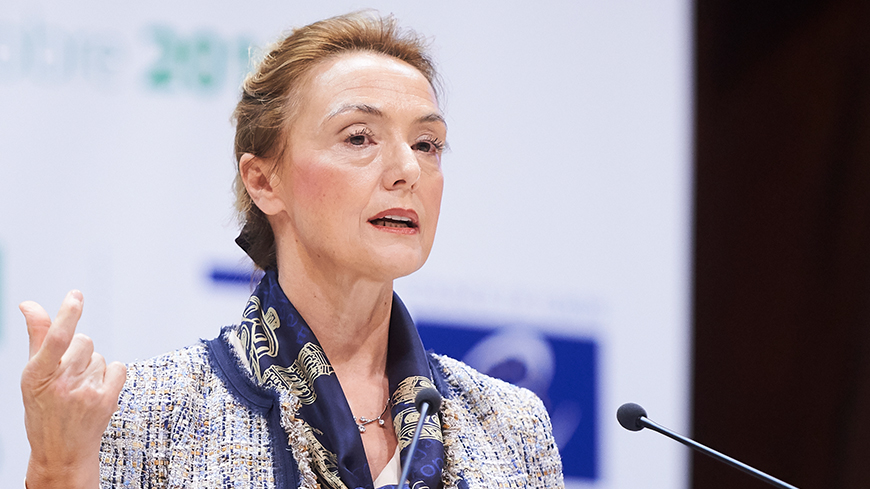 Marija Pejčinović Burić, a graduate of the Faculty of Economics of the University of Zagreb and the current Secretary General of the Council of Europe. After graduating, like Savka Dabčević-Kučar, she became o doctor of economics and before taking her current position served as Croatia's Deputy Prime Minister and Minister of Foreign and European Affairs © Council of Europe
Marija Pejčinović Burić, a graduate of the Faculty of Economics of the University of Zagreb and the current Secretary General of the Council of Europe. After graduating, like Savka Dabčević-Kučar, she became o doctor of economics and before taking her current position served as Croatia's Deputy Prime Minister and Minister of Foreign and European Affairs © Council of Europe
Graduates of the Faculty of Economics University of Zagreb have served as mayors of Zagreb and Split, Deputy Prime Minister of Croatia, Minister of Finance, Minister of the Economy, Secretary-General of the Council of Europe, Governers of the Croatian National Bank, Vice-President of the UN World Food Council, President of the Croatian Football Association, Minister of Environmental and Nature Protection, special advisors to the President of Croatia and countless university professors, including several former rectors of the University of Zagreb. Within its graduate professors, it has produced no less than 19 full members of the prestigious Croatian Academy of Sciences and Arts, more than any other single institution in the country.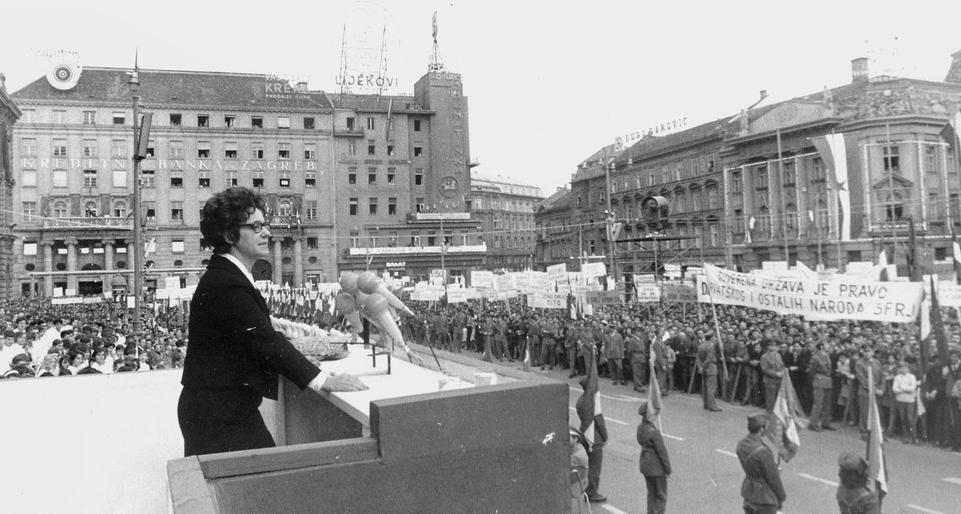 Savka Dabčević-Kučar, a graduate of the Faculty of Economics of the University of Zagreb. Born on Korčula, she became an anti-fascist in World War II, joining the partisans after her brother was beaten by fascists. After graduating, she continued to study at the faculty and became one of the first doctors of economics in Croatia, raising eyebrows by choosing to write her doctorate dissertation about a non-Marxist economic theorist (Englishman John Maynard Keynes). She became a professor at the faculty in the 1950s and despite her great advances in political life, remained a committed teacher at the faculty until 1971. In 1967, she was elected President of the Socialist Republic of Croatia. In 1969, she moved to an even more important position - that of president of the Central Committee of the League of Communists of Croatia. She was the first woman in Europe to be appointed head of government of a political entity and the first female in Croatia to hold an office equivalent to a head of government. In this picture, she addressed supporters on Ban Jelacic Square Zagreb during the movement called the Croatian Spring, which called for greater autonomy for Croatia. At the address, thousands cheered her as “Savka, queen of the Croats”. For her pivotal role in the movement, she was removed from her positions and public life and retired. She returned to politics in 1990 upon the collapse of communism in Europe and during the Croatian war of independence was one of the few politicians who visited the front lines of battle in Slavonia, Petrinja, Pokupski and the Dalmatian hinterland
Savka Dabčević-Kučar, a graduate of the Faculty of Economics of the University of Zagreb. Born on Korčula, she became an anti-fascist in World War II, joining the partisans after her brother was beaten by fascists. After graduating, she continued to study at the faculty and became one of the first doctors of economics in Croatia, raising eyebrows by choosing to write her doctorate dissertation about a non-Marxist economic theorist (Englishman John Maynard Keynes). She became a professor at the faculty in the 1950s and despite her great advances in political life, remained a committed teacher at the faculty until 1971. In 1967, she was elected President of the Socialist Republic of Croatia. In 1969, she moved to an even more important position - that of president of the Central Committee of the League of Communists of Croatia. She was the first woman in Europe to be appointed head of government of a political entity and the first female in Croatia to hold an office equivalent to a head of government. In this picture, she addressed supporters on Ban Jelacic Square Zagreb during the movement called the Croatian Spring, which called for greater autonomy for Croatia. At the address, thousands cheered her as “Savka, queen of the Croats”. For her pivotal role in the movement, she was removed from her positions and public life and retired. She returned to politics in 1990 upon the collapse of communism in Europe and during the Croatian war of independence was one of the few politicians who visited the front lines of battle in Slavonia, Petrinja, Pokupski and the Dalmatian hinterland
The Faculty of Economics University of Zagreb is the largest faculty in the country. Over its 100 year history, it has established itself as an internationally respected institution. Today, it has around 9000 persons enrolled, caters for international students with some courses in English and has produced over 86, 000 graduates, including 856 doctors of science.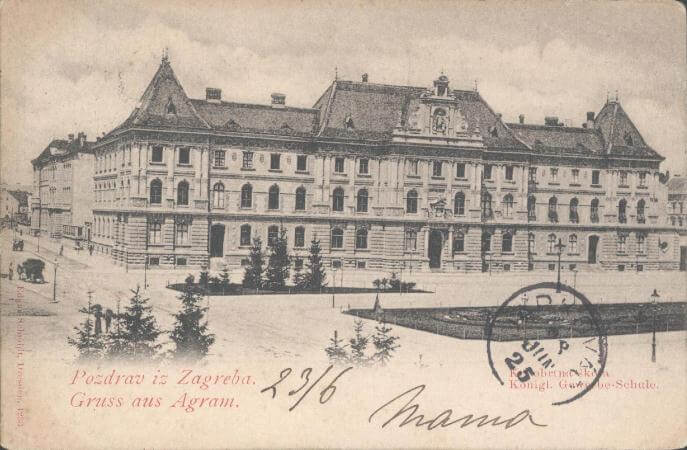 In its infancy, students of the College of Trade and Transport were taught at the Technical College, which is today the Museum of Arts and Crafts in Zagreb © National and University Library in Zagreb
In its infancy, students of the College of Trade and Transport were taught at the Technical College, which is today the Museum of Arts and Crafts in Zagreb © National and University Library in Zagreb
The history of the Faculty of Economics University of Zagreb starts with the opening in 1920 of its forerunner, the Zagreb College of Trade and Transport. Its purpose was to educate in the areas of banking, domestic and international trade, transport, consular services, insurance and the education of teachers. Its courses lasted three years and it proved so popular that in the academic year 1923/24, some 1,125 students were enrolled.
The institution held college status until 1925 when Stjepan Radić became the Minister of Education. It must have been unusual for Radić to find himself as part of the government of the Kingdom of Serbs, Croats and Slovenes, the state which preceded the Kingdom of Yugoslavia. Today, Radić is best remembered as a politician outspoken in his advocacy of autonomy for Croatia. Before his appointment to the government, he had always done so in opposition. Indeed, he had been imprisoned several times for his views, which were proclaimed loudly in his writings or in person (he was a gifted public speaker). As recently as March 1925 he had been in prison but, when the political party of which he was a member officially recognised the monarchy and the state constitution, he was freed. In a remarkable turnaround, before the year's end, he was a minister in the government.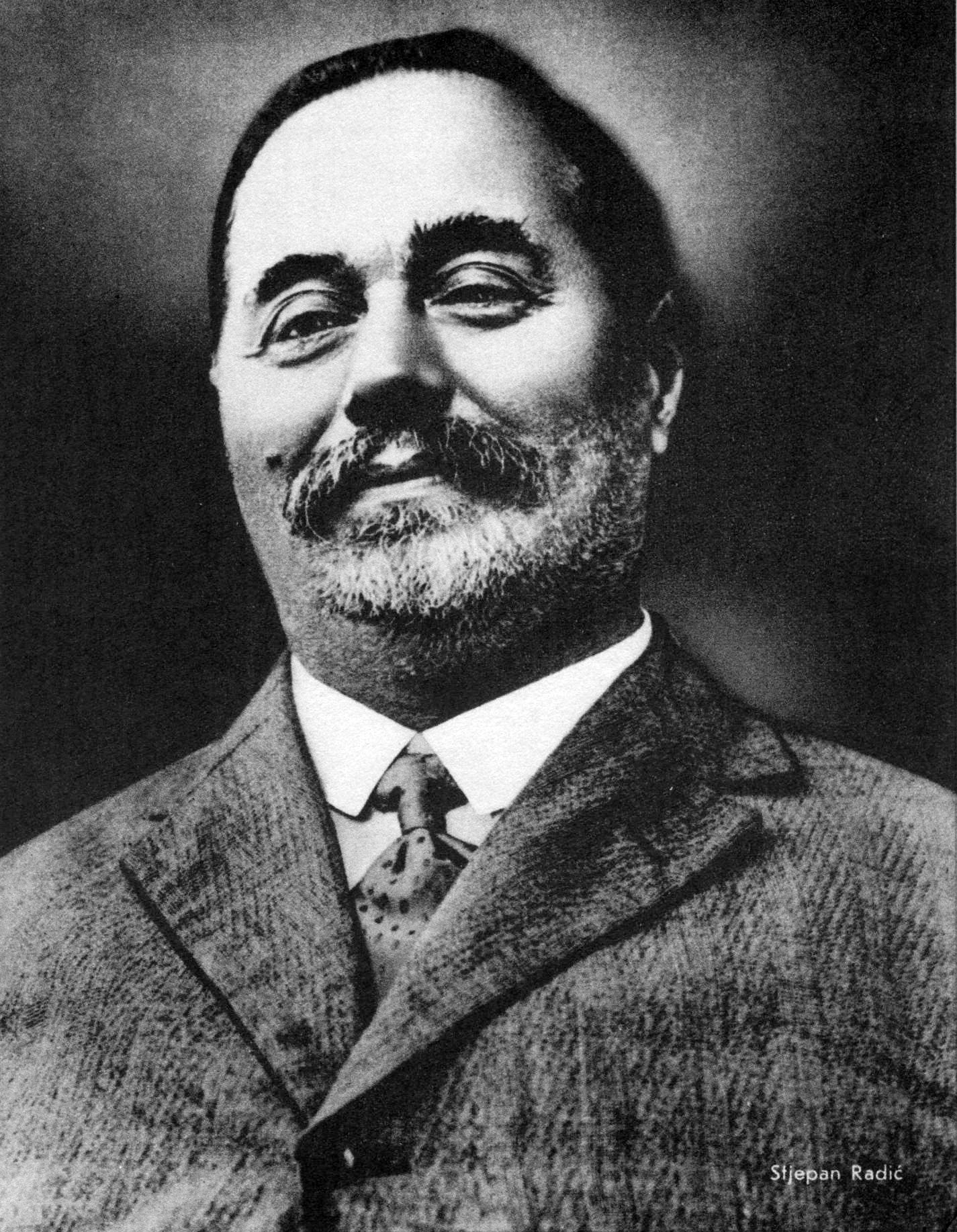 Stjepan Radić, pictured in the 1920s © public domain. In 1895 Radić was sent to prison for the public burning of the Hungarian flag in Zagreb – alongside Antun Dabčević, the father of Savka Dabčević-Kučar.
Stjepan Radić, pictured in the 1920s © public domain. In 1895 Radić was sent to prison for the public burning of the Hungarian flag in Zagreb – alongside Antun Dabčević, the father of Savka Dabčević-Kučar.
Stjepan Radić's desire for Croatian autonomy was not born from the ideals of the political class of Zagreb. The ninth of eleven children, born to a peasant family in a small village on the banks of the Sava river, just north of Sisak, Radić was very much a representative of the people whence he came. To him (and others in his family – his brother and nephew also being prominent politicians), education had the most important role to play in emancipation. He had lived in poverty in order to complete his own - after being banned from university-level educational institutions throughout the whole of the Austro-Hungarian empire for his protests against the state, he travelled penniless to Russia, France and Switzerland to complete his studies. In the latter, finance was one of his chosen subjects.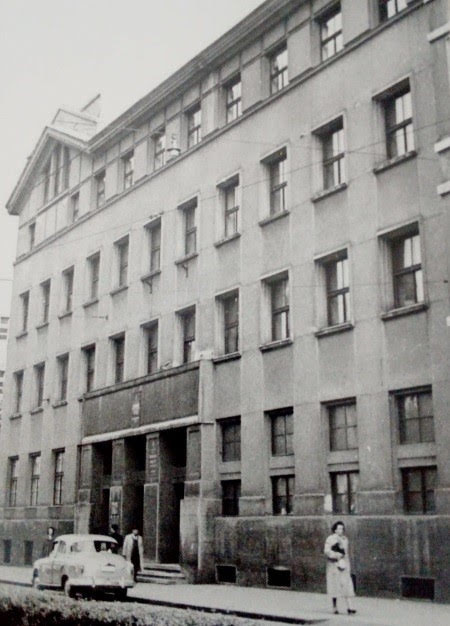 The first dedicated building of the Higher School of Economics and Commerce was located on the corner of Bauerova and Zvonirmirova © Faculty of Economics University of Zagreb
The first dedicated building of the Higher School of Economics and Commerce was located on the corner of Bauerova and Zvonirmirova © Faculty of Economics University of Zagreb
Under Radić's spell in office, the Zagreb College of Trade and Transport became the Higher School of Economics and Commerce. Its courses extended to four years, it attained university status. With no building designated to the increasingly popular institution, students had sometimes been taught at the Technical College (today's Museum of Arts and Crafts) and in parts of what is now the Mimara Museum. A dedicated home for the faculty was authorised and its construction started in 1927. Classes began at the faculty, located on the corner of Bauerova and Zvonimirova, in 1928, but within the decade the institution had outgrown its home and a plot of land in Svetice was acquired in order to build a new, larger facility. Its construction was interrupted by the Second World War and students would end up being taught on the Bauerova and Zvonimirova site all the way up to 1952.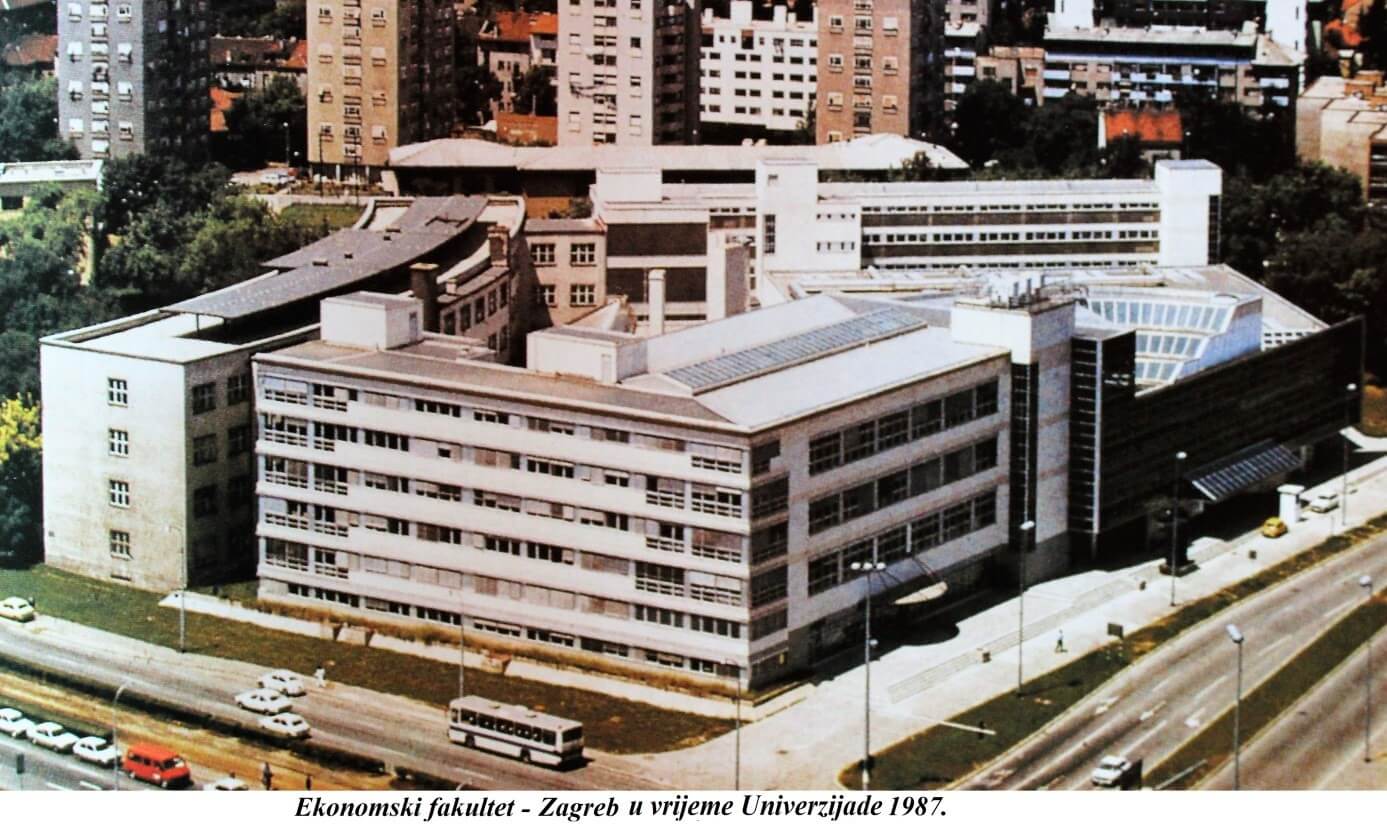 The faculty's modern building, pictured in 1987. Today, the faculty has 17 departments - Finance, Demography, Economic Theory, Business Economics, Informatics, Macroeconomics and Economic Development, Marketing, Mathematics, International Economics, Business in Foreign Languages, Organization and Management, Law, Accounting, Statistics, Trade and International Business, Tourism, Physical Education and Health © Faculty of Economics University of Zagreb
The faculty's modern building, pictured in 1987. Today, the faculty has 17 departments - Finance, Demography, Economic Theory, Business Economics, Informatics, Macroeconomics and Economic Development, Marketing, Mathematics, International Economics, Business in Foreign Languages, Organization and Management, Law, Accounting, Statistics, Trade and International Business, Tourism, Physical Education and Health © Faculty of Economics University of Zagreb
In 1947, the Higher School of Economics and Commerce became the Faculty of Economics University of Zagreb. In 1952, the faculty officially moved to the new site in Svetice. In 1968 it expanded once more when it merged with the 12-year-old College of Economics. Since then, the building at Svetice has received major upgrades and further facilities of the faculty can now also be found at the university campus in Borongaj, in Varaždin, in Koprivnica and in Bjelovar. After a century of existence, the Faculty of Economics University of Zagreb's longstanding difficulties to meet the popularity of its courses with the space available are now over. Not only can they accommodate every Croatian economy student who makes the grade, but they are also able to offer places to some of the best international students. It would surely come as no surprise if they are still educating the future elites of business, banking, finance and politics in another 100 years.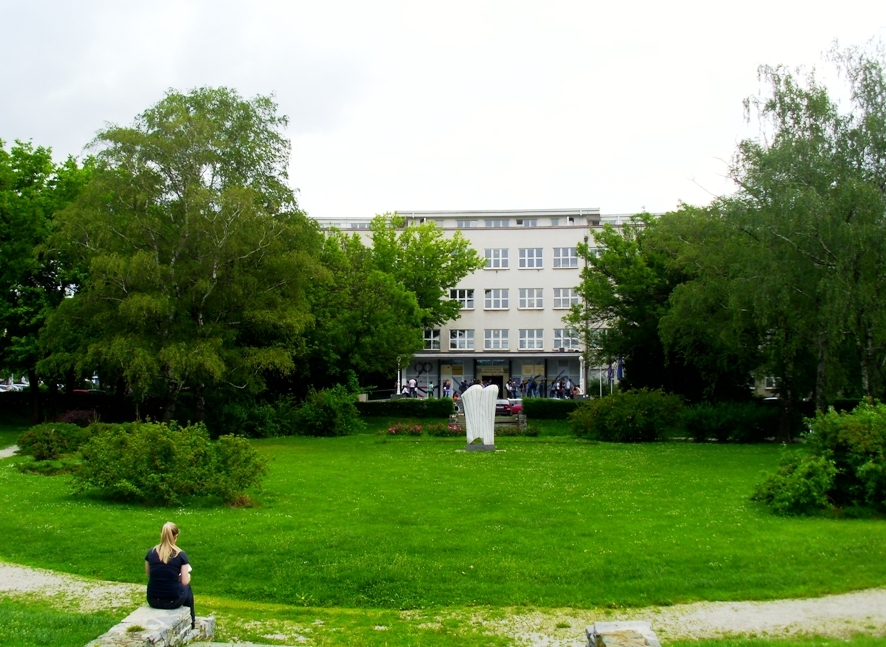
The Faculty of Economics University of Zagreb site in Svetice, as seen from its garden © Wolf - Pidgeon
FinMin Violated the Principle of Good Conduct, The Conflict of Interest Commission Says
ZAGREB, Sept 11, 2020 - The Conflict of Interest Commission found on Friday that FinMin violated the principle of good conduct by participating in a decision by the Croatian Bank for Reconstruction and Development (HBOR) to grant a loan to a company owned by his friend Josip Stojanovic Jolly.
The procedure against Maric was launched in December last year due to the possibility of bias because, in his capacity as finance minister and president of the HBOR supervisory board, he did not excuse himself from the decision to issue a loan to Stojanovic's Olympia Vodice company, which was issued with an HBOR loan for the construction of a hotel even though he had made it clear in his statements to the media that Stojanovic was a friend of his.
The commission decided on Friday that Maric was not in conflict of interest but rather that he had violated the principle of good conduct, which is not subject to any penalty.
The commission also found that Maric had not violated the law by attending a World Cup match in Russia where he was seen in Stojanovic's company, as Maric provided evidence that he personally paid for his ticket.
In a second case, the commission found that Zagreb Mayor Milan Bandic and members of parliament who crossed the floor and joined his parliamentary group had not violated the law.
The commission decided on each individual member of parliament who crossed the floor and joined Bandic's party and whether they were rewarded for that with some counter-favor. The commission found that no violation had occurred with regard to the Conflict of Interest Act.
The procedure involved Mayor Bandic and Members of Parliament Marija Puh, Mladen Madjer, Milanka Opacic, and Sinisa Varga who crossed the floor in parliament, as well as Deputy Mayor of Donja Stubica Luka Grabusic and Radoboj Mayor Andjelko Topolovec who too joined Bandic's party.
For the latest travel info, bookmark our main travel info article, which is updated daily.
Read the Croatian Travel Update in your language - now available in 24 languages
FinMin: Q2 GDP Drop Expected To Be Larger Than During Financial Crisis
ZAGREB, Aug 26, 2020 - Finance Minister Zdravko Maric said on Wednesday the GDP drop in this year's second quarter was expected to be larger than the largest drop during the global financial crisis.
The national statistical office is expected to issue a report on GDP in Q2 on Friday.
Responding to questions from the press, Maric said the government would present new forecasts for the whole year in the first two weeks of September.
The largest GDP drop to date, of 8.8%, was recorded in Q1 2009, at the start of the global financial crisis.
Six analysts polled by Hina expect GDP to drop 13.9% year on year. This will be the first drop since mid-2014 and the largest since 2000.
Maric said everyone realized how much the state-supported the economy this year via job retention measures, but added that this could not be done indefinitely.
New programs are opening up, such as the EU's SURE program, from which Croatia is expected to receive €1 billion in favorable loans which will most likely be used to finance a shorter working week.
Maric said Croatia fared even better with the Next Generation EU instrument, the coronavirus recovery plan in which Croatia will have €9.4 billion at its disposal. He said the big challenge now was to draw the highest amount possible as quickly and as effectively as possible.
For the latest travel info, bookmark our main travel info article, which is updated daily.
Read the Croatian Travel Update in your language - now available in 24 languages


